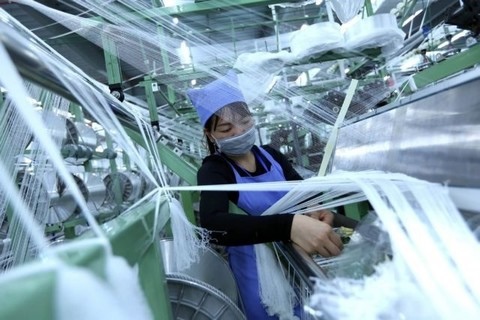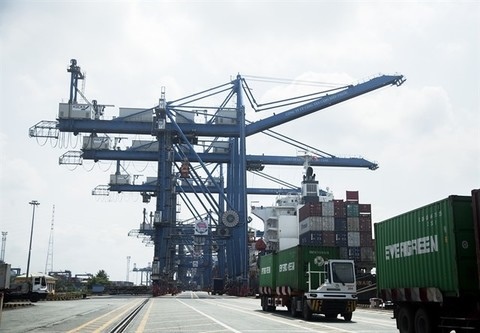Growing pains: Vietnamese farmers are producing plenty. Now they just need customers
Growing pains: Vietnamese farmers are producing plenty. Now they just need customers
Campaigns calling on local consumers to ‘rescue’ farmers by buying from huge stocks of unsold produce are becoming increasingly common in Vietnam.

Calls for action, such as one in Phu Ninh District, Quang Nam Province, encouraging local residents to purchase watermelons from farmers who had grossly overproduced during the planting season, are becoming commonplace in rural localities throughout the country.
Though their crops are ready for harvest, Phu Ninh farmers are staying out of the fields, worried that the current value of watermelon, a mere VND1,000 per kg, is too low to cover their costs. (VND22,700 = US$1)
Vo Thanh Anh, head of the Phu Ninh agricultural bureau, said that as of May 8, farmers in the district had already overproduced watermelons by more than 1,000 metric tons.
"Farmers began increasing their watermelon production when the price topped VND6,000 per kg, but consumption slowdown in China, their main market, has since caused the price to plummet,” Anh explained.
Though the agricultural bureau had originally zoned only 400 hectares in the district for growing watermelon, farmers were quick to jump on the bandwagon when they saw the potential for profits.
The result? Approximately 490 hectares used for growing watermelon and massive amounts of unsold stock.
Overproduction is becoming a major headache for local administrations throughout the country.
From January to May this year, agricultural ministries in rural areas turned to ‘rescue campaigns’ – initiatives aimed at convincing residents to purchase overplanted locally grown produce – to ease the financial woes of farmers in the area.
Facebook campaigns took off in February as activists attempted to convince people to purchase unsold peach blossoms and lilies left over from the Lunar New Year holiday.
In March, young people from Vietnamese Youth Development in Hanoi launched several different drives to help rid farmers over overstocked kohlrabi, potato, and radish, after prices of those vegetables fell between 50 and 66 percent.
Yearly recurrence
Campaigns aimed at rescuing Vietnamese farmers from the woes of overproduction began in 2014 and 2015, when Indonesia suddenly stopped importing shallots, dealing a huge blow to famers in the Mekong Delta province of Soc Trang.
The situation left farmers without a market for the 150,000 metric tons of shallots they had produced.
Farmers in Quang Nam and Quang Ngai, two central Vietnamese provinces, found themselves in a similar situation in 2015 when the price of watermelon suddenly dropped below the cost of their production.
That same year, 1,500 metric tons of dragon fruit in the south-central province of Binh Thuan was left without a market when Chinese traders halted buying, marking the third time in 2015 the country was left scrambling to settle agriculture problems related to oversupply.
In the beginning of 2017, banana farmers in several provinces took a hit when prices plummeted from VND14,000-17,000 per kg to VND1,000-3,000 per kg.
In April of that year, farmers in Quang Ngai were once again left exposed to heavy losses after being unable to sell watermelons once the price collapsed.
In 2018, the price of pork in Vietnam dipped to historic lows of VND15,000-VND18,000 per kilogram, about equal to the cost of a few glasses of Vietnamese iced-tea.
The situation was so bad that the Ministry of Agriculture and Rural Development sent officials to China to solicit buyers.
What causes overproduction?
The root of Vietnam’s oversupply issues stems from weak connections between farmers and traders, an inability to forecast the market, old-fashioned farming methods, and the rush for instant and easy cash.
“Vietnamese farmers are weak at linking production with marketing. The result is the overproduction of many agricultural products,” said Minister of Agriculture and Rural Development Nguyen Xuan Cuong.
Some experts also blamed the overpoduction on unplanned cultivation, saying many farmers rush to grow items that fetch high prices in previous years without considering any changes to the current market.
Most have little or no knowledge of the local market or global demands and price trends, yet still choose to ignore recommendations from authorities.
This lack of foresight often magnifies the negative effects of slight fluctuations in foreign markets, particularly China.
Product quality is another big problem.
According to Deputy Agriculture minister Vu Van Tam, demand for farm produce like bananas, watermelon, and pork is very high in both domestic and foreign markets but poor quality and productivity force consumers to turn to non-Vietnamese goods.
What’s next?
In his remarks at a recent working session with provincial authorities, Deputy Prime Minister Trinh Dinh Dung emphad that in order to develop the livestock sector, it is necessary to create a closed value chain throughout feed processing, raising livestock, slaughtering, processing, and marketing stages.
Farmers would then be able to sign contracts to sell their produce to suppliers at fixed prices.
Concerning the plant cultivating sector, Vu Vinh Phu, former president of the Vietnam Supermarket Association and former deputy director of the Hanoi Trade Department, emphad the role of the government, private enterprises, and other stakeholder organizations.
Vu underlined that state management is the most important measure in guiding production, distribution to consumers, the reduction of monopolies and transportation costs, and creating a healthy competitive environment.
“The involvement of enterprises in providing market information, planning and production advice, and purchasing products directly from locals is also a practical approach in the current context,” he added.
Overall, both experts and officials commented that only macro solutions outlined and implemented by the government will help settle the problem.









